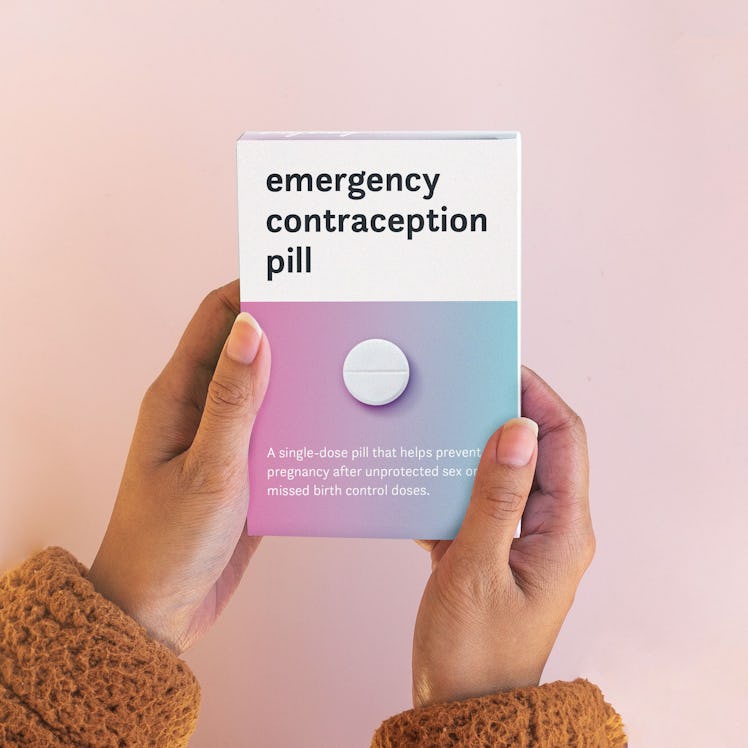
This Campaign Gave Away So Much Free Birth Control To Make A Point
It hasn't been an easy few months for women and people with uteruses. After legislators passed wildly restrictive abortion laws in states such as Georgia and Missouri in the spring of 2019, advocates for reproductive rights quickly spoke out to challenge the laws and support the people affected by the loss of reproductive access. And now, this advocacy group and contraception provider have teamed up to take action to support those affected. Pill Club and Power To Decide's Freedom to Decide campaign provided free emergency contraception to those in need as a way to push back against reproductive rights restrictions, and can I just say, this is something I can get behind.
The campaign, which launched on Aug. 6, is a partnership between mail-delivery birth control service Pill Club and reproductive rights group Power To Decide, which works to eliminate unplanned pregnancy through education and promoting access to contraception. In less than 24 hours, the partnership gave out a whopping 5,000 doses of emergency contraception. Now the two are raising money for Power To Decide's BCBenefits Campaign to help low-income people get access to birth control, with Pill Club matching up to $10,000 in donations. The move is directly linked to recent abortion limitations in states such as Alabama and Georgia, where state laws have put in place de facto bans on abortion and major limitations on access to reproductive care. While under federal law states cannot outright ban abortion, they can and do regulate it to the point that it becomes essentially inaccessible, banning abortion after a date by which many people don't know they're pregnant, or enacting "trigger" laws that would ban abortion if federal law changed.
So what to do? Well, for Pill Club and Power to Decide, the answer was do what they do best — help people avoid unplanned pregnancy. “We’re trying to do our part by giving people greater access to emergency contraception and lending our support to Power to Decide,” Pill Club founder and CEO Nick Chang said in a statement shared with Elite Daily. "Limits on reproductive rights, like what is happening in states across the country, are in direct opposition to our company’s values.”
While abortion access makes headlines, access to contraception, including emergency contraception, is a huge part of ensuring reproductive rights — and one that is also under attack. "What we know is that with the domestic gag rule going into effect, the safety net for women, particularly low-income women, is more fragile," Ginny Ehrlich, the CEO of Power To Decide, tells Elite Daily in an interview. In February 2019, President Donald Trump's administration implemented changes to Title X, a federal grant program which provides funds for family planning and contraception. Under the new rules, organizations that provide abortions or even offer referrals for them would no longer be eligible for funding. "We know that a number of providers of Title X quality services have chosen to pull out of the network because they know they can't reconcile providing care that they know is not ethical," Ehrlich says, "because they aren't able to provide the full range of information to their clients." In a February 2019 statement to Elite Daily, the Department of Health and Human Services (HHS) denied that the change was a gag rule, and that health services may provide "non-directive counseling" on abortion, but not offer abortion referrals for family planning purposes.
According to Power To Decide's website, some 19 million American women live in areas where they don't have easy access to the full range of contraception available. That's where services like Pill Club come in. Getting your pills — be they regular birth control or emergency contraception — through the mail can take away a lot of the barriers in terms of access. And time, distance, and money aren't the only possible barriers. "It also might be an issue of feeling safe from a privacy perspective," Ehrlich notes. "If a woman lives in a small town, for example, and there's one pharmacist and the pharmacist might be someone she knows. The mail order option provides a level of privacy."
Campaigns such as Freedom to Decide, Ehrlich says, are a way to "stopgap some of the immediate challenges and urgent challenges that real women are facing as a result of various rules and laws that have recently gone into effect."
That's why Power to Decide's work to help low-income people access birth control is so important. The BCBenefits fund supports people who are living at or below 250% of the federal poverty level access birth control, by reimbursing costs not covered by insurance, and even helping with childcare and transit costs if someone needs to travel to find the method right for them. And a little goes a long way. "We know that for the cost of takeout, for example — about $50 — we can provide women hormonal contraceptives for a year," Ehrlich says.
While the state of reproductive rights legislation in 2019 might be troubling, advocates clearly aren't letting these changes happen without a fight — they're coming from all sides, and in the mail.